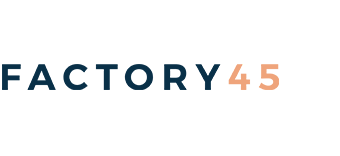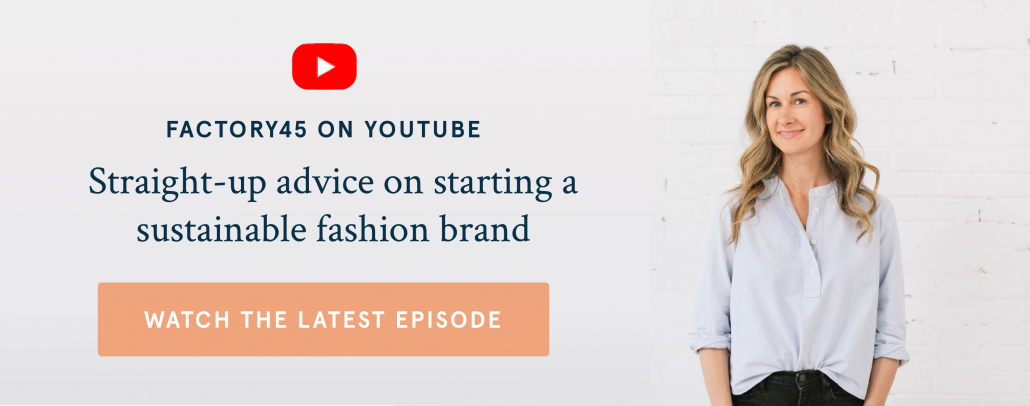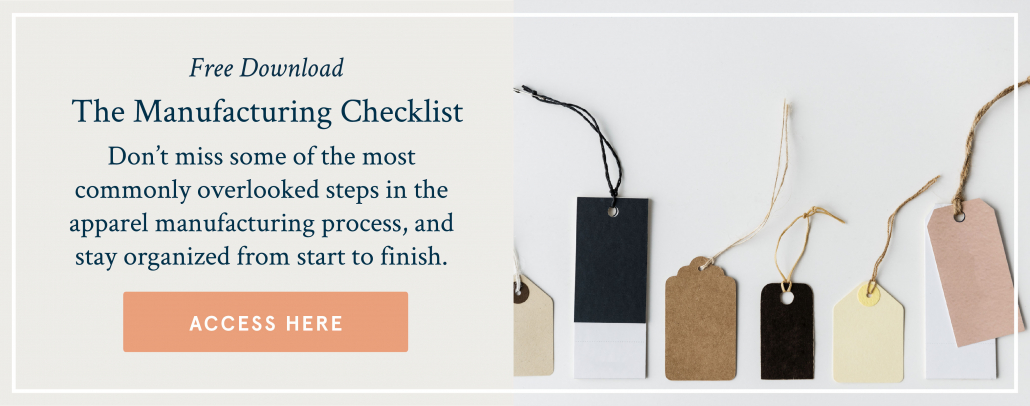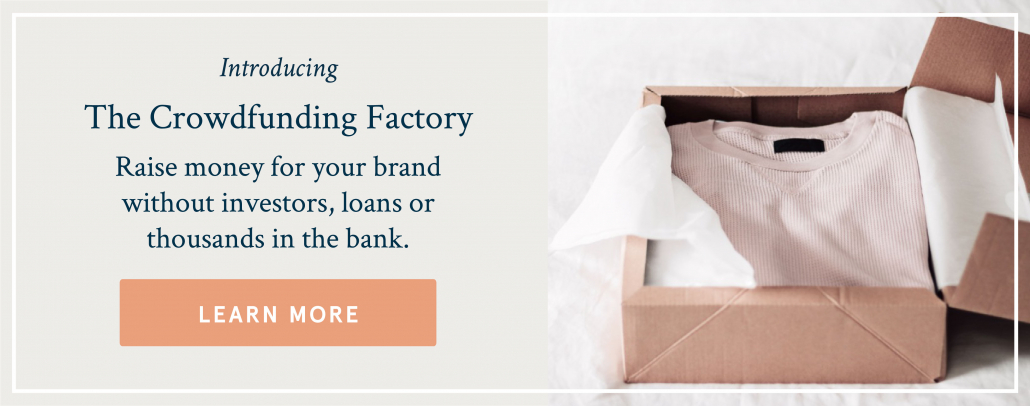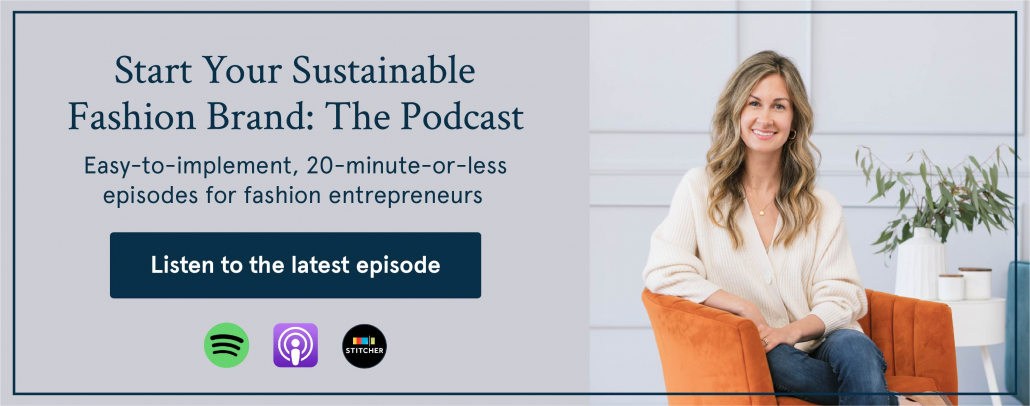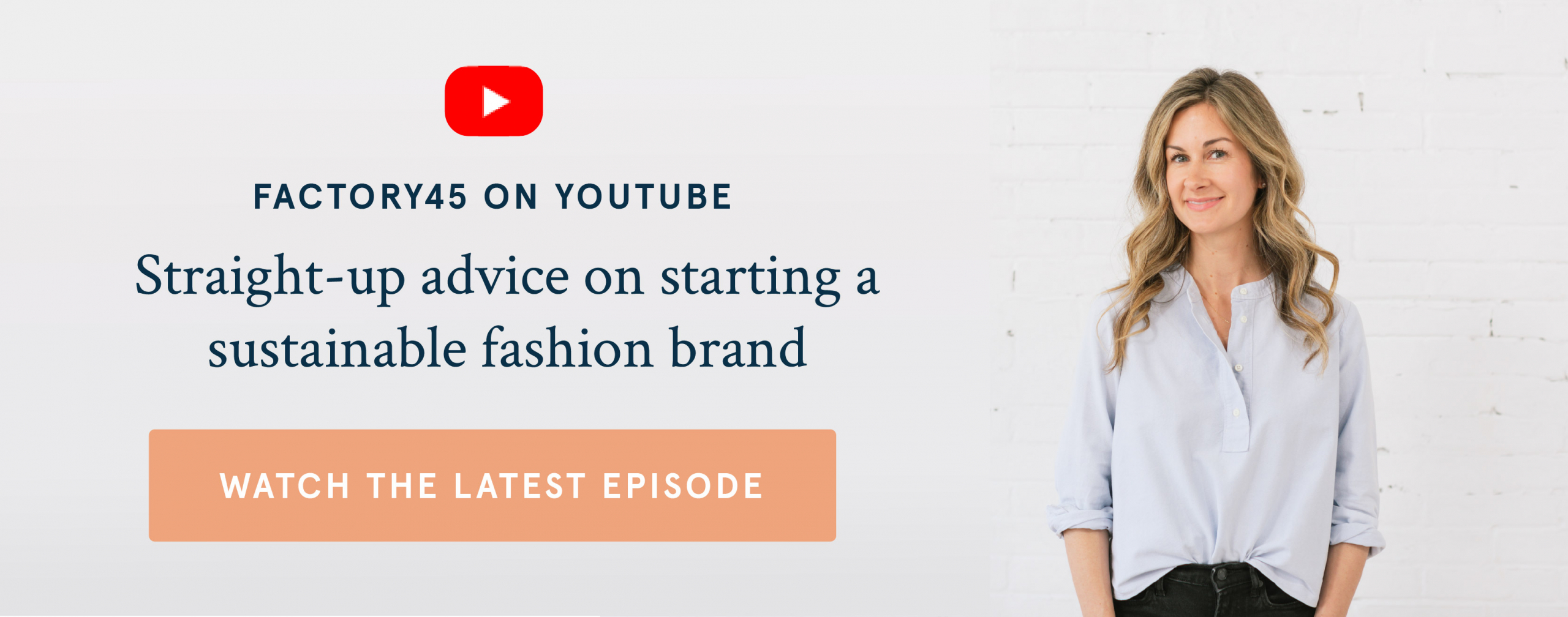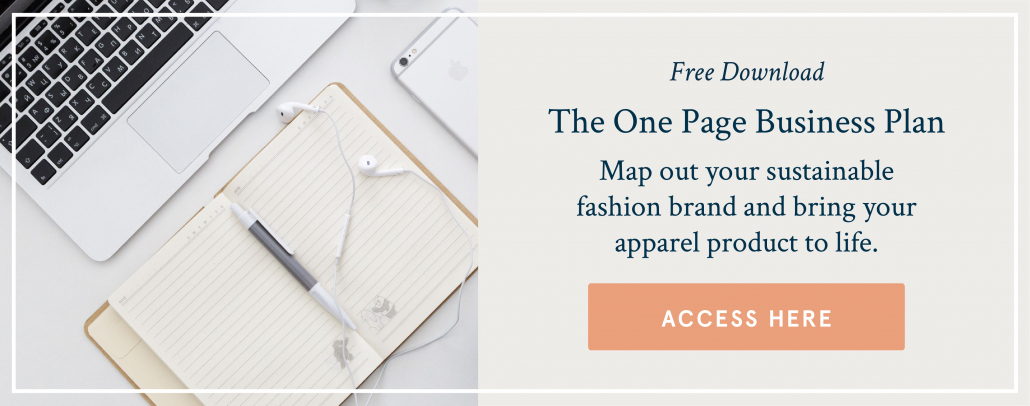Listen on Apple Podcasts | Listen on Spotify
Are they even “secrets?” Well, they were definitely secrets to me when I was first starting out. Don’t worry, I won’t bore you with “teamwork makes the dreamwork” cliches. I’m going to teach you the real, tactical advice with the personal stories and proof behind them. After a decade of entrepreneurship and mentoring hundreds of fashion entrepreneurs… Here are my 5 secrets to fashion business success.
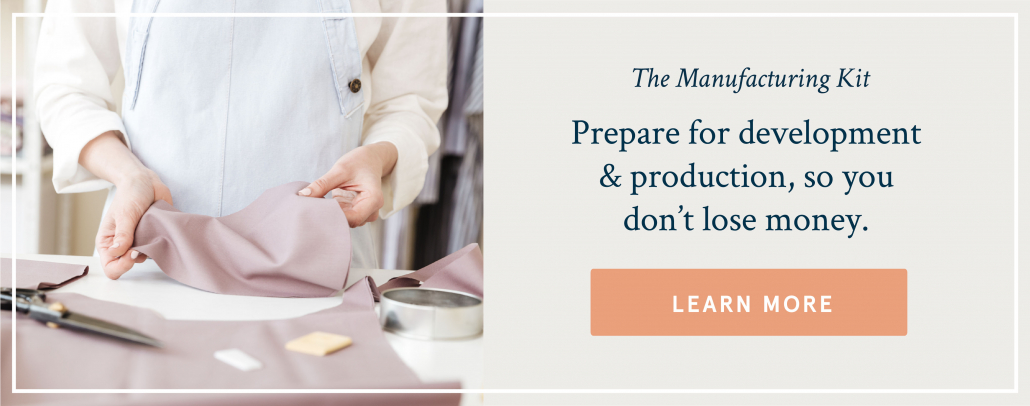
TRANSCRIPT
Before we jump into this episode I want to make sure you know that our one-day, online event is happening tomorrow, Jan. 26th and today is the last day to register! The Fashion Business Summit is for early-stage fashion entrepreneurs who want to take action, pursue their passion and make 2023 the year they start selling. You can register for free and grab your VIP Pass at factory45.co/summit Okay, onto the episode.
So, what are the 5 secrets to fashion business success? Let’s dive right in with #1…
#1 Successful fashion brands start niche.
In other words, narrow down your audience to a very specific type of person, or a very specific type of product — or ideally, both.
I know, I know, why wouldn’t you want to broaden your audience and products to sell to as many people as you possibly can? Because if you try to appeal to everyone, you’ll end up appealing to no one. Broad does not equal better.
You will increase your likelihood of success exponentially if you start narrow and widen your offering over time, as your company grows and your cash flow increases. Why? Because starting very specific 1.) Ensures that your ideal customer finds you faster, 2.) Makes them feel like your brand was made for them, 3.) Creates clarity for you every time you write any sort of marketing copy, create brand imagery, make design decisions, etc. You know exactly who you’re creating for.
Look at brands like Eileen Fisher, Reformation and Patagonia. These are pretty big companies and they’re still appealing to niche audiences. Brands like Spanx, Nike and Coach started with one product offering and then expanded that niche offering as they grew.
You wouldn’t believe how many people overlook this advice when they’re first starting out. And it kills me when I see new entrepreneurs making their first year of business even harder than it has to be. Because another benefit of starting niche is that it allows you to simplify, in every way. And if you ask any successful entrepreneur, the ability to simply move forward is half the battle.
#2: Successful businesses aren’t derailed by competition.
There is nothing that can quite prepare you for discovering your first real competitor. I’ve gotten more than one late-night email from Factory45 grads along the lines of: “Shannon, do you know about this brand? It’s so similar to mine! What do I do?”
The first time it happens, you’re allowed to freak out. It’s normal to enter a state of panic. As long as you don’t quit. Because that’s likely going to be your first instinct. “Well!” *throws hands up in the air* “If she’s doing it, then there’s no point in me doing it! Guess that dream is OVER.”
As soon as those words come into your mind, here’s what I want you to do: Walk away. But only for a day. Go to yoga, play with your kids, have dinner with your partner, call a friend you haven’t talked to in a while. The next day, come back. Because you’re going to find that the initial disappointment of discovering a competitor will have diminished — at least slightly. Gradually, you’re going to feel reinvigorated by your idea and your business and you’re going to be glad you didn’t give up on it. For all of these reasons.
And as your business progresses and your customer-base grows, the concern about competition is going to fade. You’re going to become more certain about your place in the market and more confident that you’re the person to pull it off. You’re going to realize that there really is room for all of us. Let me repeat that, there is room for all of us.
Having been through this experience myself with competitors coming in and out of the fashion education space, I’ve been able to get a grip on how competition makes me feel. While I’m aware of it, I generally don’t worry about it anymore. Not because I don’t still have fears, but because I know it doesn’t serve me in any positive way.
Successful businesses aren’t derailed by competition. They don’t slow down, they stay the course and they don’t get distracted. Most of all, they keep showing up.
#3: Successful entrepreneurs do things they’re not passionate about because they know that it’s not just about passion.
There is a lie being told in the entrepreneurial world. It’s a false narrative that’s being targeted at people who are unhappy with their current work life and are looking for a change. Maybe you’re one of those people. The lie is this: Follow your passion. Quit your job and chase your dreams. Do work you love and you’ll never work a day in your life.
We see it every day: the Facebook and Instagram ads promising your “dream life” by people who look like they’re living their dream life. It’s all palm trees and perfectly-foamed lattes and bright, white lighting. But do you know what’s behind those beautiful photos and “dream lives?” Many, many, many months (probably years) of it not looking that way.
Because the truth is, to become the picture of success — while creating a business that lasts — it requires this: Doing work you don’t want to do. In fact, when you’re first starting out, you can expect to do more work that you don’t want to do than work you actually enjoy. And usually, it requires running your business as a side hustle while *still* going to your “real job.”
We all know there’s no such thing as overnight success. But what I don’t think we always remember is that there’s so much more to the story than what we see on social media. Chances are: The fashion brand with the perfectly curated Instagram feed started with an iPhone and a Dropbox folder of stock photos. The designer working in a beautifully-lit studio started in a converted home office that barely fit a desk. The CEO flying first class to a paid speaking gig spent years sitting in the back of the plane to speak for free. If you’re ready to start your own business, you should absolutely do it. It’s one of the most rewarding journeys you can take. But there should be no illusions. It will require “grunt work” — the things you think everyone else is outsourcing to interns — are the things you need to do yourself when you’re first starting out.
Packing and fulfilling orders, writing and scheduling your own social media posts, creating your emails and blog posts, going to networking events, dealing with tech issues that make you want to pull your hair out. Those “annoying” tasks that tempt you to procrastinate or abandon them all together are the things you’ll look back on with genuine appreciation. They’re the things that will make you grow, build new skills and realize that you’re capable of more than you think. Because every successful entrepreneur I know has a similar story of doing work they didn’t want to do. That’s what it takes.
It’s not about passion. It’s about purpose.
#4 To start a successful business, you must be willing to invest in uncertainty.
So, here’s an unpopular (secretly popular) topic: Money. More specifically, how to start a business when you don’t have a lot of money. If you scour the internet, you can find enough stories of multi-millionaires who started from zero, eating chickpeas out of the can while sleeping on their friend’s futon.
But there’s a less extreme version of this, and it’s far more common. It’s the story of the woman craving a creative outlet. She’s managed to save a small “safety net” of cash and even has some disposable income at the end of the month. She sees acquaintances on Facebook breaking out on their own. And she wonders to herself, how did they do it? What do they know that I don’t? So she starts to research. “How to start a clothing line,” she types into Google. From Marie Claire to WikiHow to “Startup Bros,” she faces 938,000,000 search results.
Overwhelm begins to set in, but she makes one conscious choice: To take the first step.
This was my reality in 2010. I was just starting out, trying to launch a sustainable fashion brand, and I had no idea what was what or who was who. The entire industry was a mystery to me with limited access. Nevertheless, I committed to putting $5,000 into a business bank account as an investment in a company I didn’t yet have. I’ll never forget transferring that hard-earned cash as one lump sum, knowing that it was all of my savings and probably money that I would never see again. It was a calculated risk, and there were no guarantees. When I look back on that first bank transfer I remember it as the first of many times I took a risk for my business without knowing how it would turn out.
Nine years later, I now know it’s the name of the entrepreneurial game. Whether it was investing money into a Kickstarter campaign I wasn’t sure would be successful or hiring a business coach or buying the numerous online courses I’ve enrolled in, what I’ve learned is this: You have to be willing to invest in your business before you know it’s a sure thing. I don’t mean that you should take out a second mortgage or drain your 401K, but you have to be willing to spend money to start or grow a business. There is no way around it. So, how do you do this without succumbing to the fear of bankruptcy and homelessness? Create a “worst case scenario” plan.
Over the years, I’ve always told myself that if I lost all of my savings I could jump behind a bar and start pouring drinks again. As much as I hoped my bartending days were over, I knew that I could make cash quickly if I had to. For you, it might be nannying or waitressing or admin or cleaning houses or freelancing. Depending on how dire your “worst case scenario” plan is, having one can do two things: 1. Be an indication that you’re not ready to take action on your business. 2. Or liberate you.
It’s the litmus test you need to make a big financial decision. You must be willing to invest in uncertainty. Because there is not an entrepreneur I know who got their company off the ground for free.
#5 To build a successful business, you have to be willing to start before you’re ready.
A couple years ago I started a YouTube channel – on a whim. I know, I sound like a 17-year-old beauty blogger. The reasons for creating videos were obvious, but beyond filming the actual content, I had no idea where to start.
So, I bought an online course that teaches YouTube for entrepreneurs. While I thought I could probably figure it out on my own, I didn’t want to. I knew there was so much more that went into the strategy behind YouTube, and I wanted someone to tell me exactly what to do step by step. So, I got to work. And as I started going through the course, researching content ideas, writing scripts, sifting through Google Keywords, I started to wonder: What did I get myself into?
Because, to be honest, the whole process not only felt unnatural to me, but very uncomfortable. Every ounce of my being wanted to shoot and reshoot and have multiple camera angles and great lighting and a professional set. I could come up with every excuse to procrastinate: “I shouldn’t shoot today because the ring light hasn’t arrived.” “I shouldn’t shoot today because there’s construction noise outside.”
Here’s the thing: If I spend months creating videos and never grow my viewership past my mom and my mother-in-law, then at least I’ll know it was a “failed” experiment that isn’t worth pursuing. That’s the only way to know if an idea is truly worthwhile — by putting it out into the world and testing it. The timing is never going to be perfect, you’re never going to feel ready and yes, it’s going to feel vulnerable and scary as hell.
But what’s the alternative? The alternative is playing small, never taking a risk and being too afraid to put yourself out there.
Whether it’s launching a first-time fashion business, a brand new collection or a YouTube channel of all things, there is never going to be a better time than now. Because whether you wait another month, or another year or another five years, you’re going to wish you had started today. There is always a small step you can take now to set you up for bigger steps tomorrow — especially since everything takes longer than you think it will,
So, the most important lesson I have for you today is this: Success comes from experimenting with new ideas and not being afraid to feel uncomfortable. When you push the limits and stop waiting for perfection or permission, then that’s when incredible things happen.
If you’re thinking about starting a sustainable fashion brand this year, I want to help set you up for success. I’m hosting the Fashion Business Summit tomorrow January 26th from 12-4pm ET. Today is the last day to register at factory45.co/summit – grab your VIP Pass right now and I hope to see you there!
